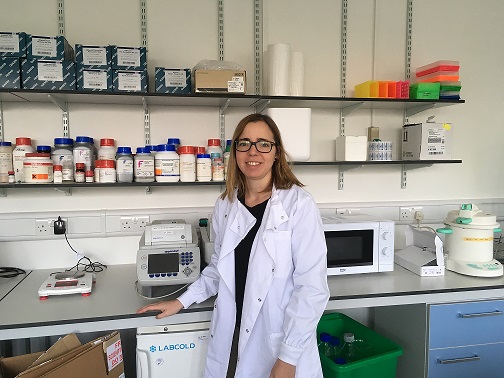We would like to introduce you to a new member of staff – Dr Marta Farré Belmonte who joined the School of Biosciences in October 2018.
In general the research within the School of Biosciences has a strong molecular focus, whereas Marta’s research is more focussed on evolution. We’ve asked her to explain her research interests and also to discuss her first impressions of the students.
Tell us about your background:
In 2008 I started my PhD at Universitat Autonoma de Barcelona using genomics and bioinformatics to study genome evolution in mammalian species, particularly primates. Then, I obtained a 10-month fellowship to work on phylogenetics of carnivores and fungi at Yale University. In 2012 I finished my PhD and moved to Aberystwyth University to start my first postdoc on genome evolution on ruminants. After a year the lab moved to the Royal Veterinary College where I stayed until September 2018 as a postdoctoral research associate. I then joined the School of Biosciences at the University of Kent.
Why did you decide to come to the University of Kent’s School of Biosciences?
I was aware of the interesting research going on here and I saw scope for some exciting collaborations. I’m now developing these collaborations with Dr Alessia Buscaino and her Research group (part of the Kent Fungal Group), as well as with Prof Darren Griffin and Dr Peter Ellis on genetics. Another reason for coming to Kent was the nice environment of Kent and the beautiful city of Canterbury.
What is currently the focus of your research?
Our lab aims to study genome evolution and the genetic changes associated with individual and species differences to understand how species arise and how we can work to conserve them. In particular, we focus on the dynamics of genome evolution in mammals. Although genome and chromosome evolution have long been studied, we still know very little about the functional consequences of these changes and the role they might have played during evolution and speciation. To address these questions, we use ruminants (cattle, sheep, antelopes, deer and giraffes) and rodents (mouse, rat, water voles) as models and take a multidisciplinary approach that combines experimental and bioinformatic analysis to produce genomic and transcriptomic data for several species, generating results of interest to diverse fields.
What are your first impressions of the students in the School of Biosciences?
I currently teach a module titled “Genetics and Evolution” to first year students, and I will be involved in a new module for second year students called “The Genome”. I am also the academic adviser of 10 first year students. I also supervise an MSc-R student working on bioinformatics and genome evolution of rodents. So far the students I met are really enthusiastic and I’ve been contacted by several showing interest in my research and teaching, which is brilliant!
For more details on Marta, including a list of publications, see her staff profile or contact her on m.farre-belmonte@kent.ac.uk
A fully funded PhD studentship with Marta as supervisor is currently advertised for a September 2019 start. See Investigating the co-evolution of chromosome organisation and gene expression The application deadline is 11th February 2019.
Marta is also available to supervise Masters by Research students in Genetics or Computational Biology in academic year 2019/20.

